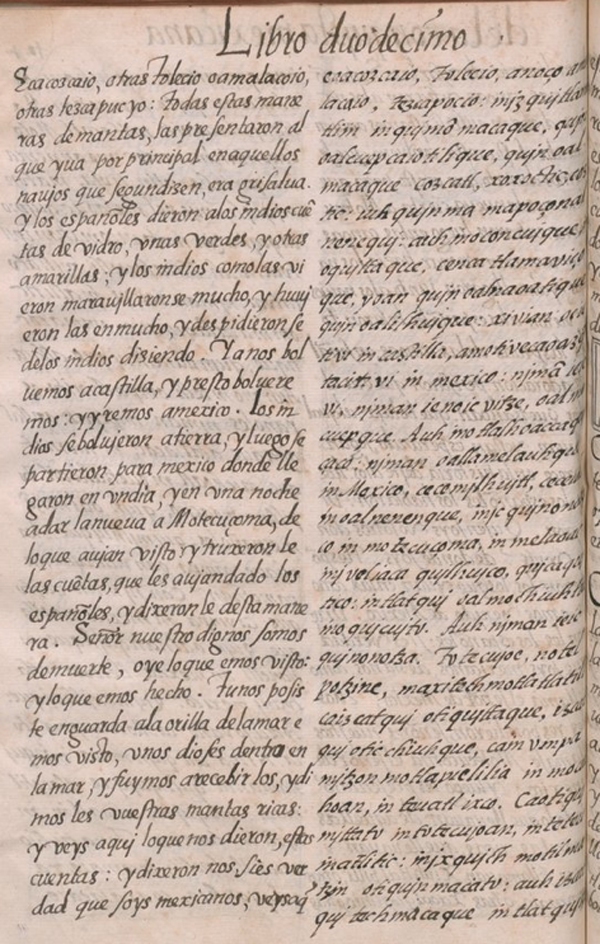Folio 4 verso
Translations and Transcriptions
Spanish Translation
[Translation of the Nahuatl into Spanish by Fr. Bernardino de Sahagún; transcription of the Spanish (left-hand column) by James Lockhart:] [f. 4v.] Ecacozcaio, otras tolecio o amalacoio, tezcapucyo: todas estas maneras de mantas, las presentaron al que yua por principal en aquellos nauios que segun dizen, era grisalua. Y los españoles dieron a los indios cuētas de vidro, vnas verdes, y otras amarillas; y los indios como las vieron marauillaronse mucho, y huuieronlas en mucho, y despidieronse de los indios diziendo. Ya nos boluemos a castilla, y presto bolueremos: y yremos a mexico. Los indios se boluieron a tierra, y luego se partieron para mexico donde llegaron en vn dia, y en vna noche a dar la nueua a Motecuçoma, de lo que auian visto: y truxeronle las cuētas, que les auian dado los españoles, y dixeronle desta manera. Señor nuestro dignos somos de muerte, oye lo que emos visto: y lo que emos hecho. Tu nos posiste en guarda a la orilla de la mar emos visto, vnos dioses dentro en la mar, y fuymos a recebirlos, y dimosles vuestras mantas ricas: y veys aqui lo que nos dieron, estas cuentas: y dixeronnos, si es verdad que soys mexicanos, veys aq̄
English Translation
[Translation of the Nahuatl (right-hand column) by James Lockhart:]
the style with wind jewels, the style with
Analytic Transcription
[Transcription of the Nahuatl (right-hand column) by James Lockhart:] [f. 4v.] coacozcaio,* Tolecio,** anoço amalacaio, Tezcapocio: in izquitlamātli in in quimōmacaque, quinoalcuepcaiotilique, quinoalmacaque cozcatl, xoxoctic, coztic: iuhquin ma mapoçonalnenequi: auh in oconcuique, inoquittaque, cenca tlamaviçoque, yoan quinoalnaoatique: quinoalilhuique: xivian oc ietivi in castilla, amo tivecaoazq̄ tacitivi in mexico: nimā ie ic vi, niman ie no ic vitze, oalmocuepque. Auh in o tlalhoacca quiçaco: niman oallamelauhque in Mexico, cecemilhuitl, ceceioal in oalnenenque, inic quinonotzaco in motecuçoma, in melaoac in iveliaca*** quilhuico, quicaquitico: intlatqui oalmochiuhtia in oquicuito. Auh niman ie ic quinonotza. Totecuioe, notelpotzine, ma xitechmotlatlatili ca iz catqui otiquittaque, iz catqui oticchiuhque, ca in vmpa mitzonmotlapielilia in moculhoan, in teuatl ixco. Ca otiquimittato in totecuioan, inteteu in atl itic: in ixquich motilmatzin otiquinmacato: auh iz catqui techmacaque intlatquitzi. ---------- *COACOZCAIO. The Spanish version's "Ecacozcaio" seems preferable. **TOLECIO. I provisionally follow Sahagún 1950-1982: 13.6 in the rendering of this form. "Covered with turkey blood," however, ought to have been written "Totolezio." More tempting, if improbable, would be "Toltecaio" 'in Toltec style.' *** IN IVELIACA. I have neither seen nor hit upon any adequate explanation of this word. The Spanish version suggests “what they had seen,” which also has logic on its side.
Image

Spanish Translation
[Translation of the Nahuatl into Spanish by Fr. Bernardino de Sahagún; transcription of the Spanish (left-hand column) by James Lockhart:] [f. 4v.] Ecacozcaio, otras tolecio o amalacoio, tezcapucyo: todas estas maneras de mantas, las presentaron al que yua por principal en aquellos nauios que segun dizen, era grisalua. Y los españoles dieron a los indios cuētas de vidro, vnas verdes, y otras amarillas; y los indios como las vieron marauillaronse mucho, y huuieronlas en mucho, y despidieronse de los indios diziendo. Ya nos boluemos a castilla, y presto bolueremos: y yremos a mexico. Los indios se boluieron a tierra, y luego se partieron para mexico donde llegaron en vn dia, y en vna noche a dar la nueua a Motecuçoma, de lo que auian visto: y truxeronle las cuētas, que les auian dado los españoles, y dixeronle desta manera. Señor nuestro dignos somos de muerte, oye lo que emos visto: y lo que emos hecho. Tu nos posiste en guarda a la orilla de la mar emos visto, vnos dioses dentro en la mar, y fuymos a recebirlos, y dimosles vuestras mantas ricas: y veys aqui lo que nos dieron, estas cuentas: y dixeronnos, si es verdad que soys mexicanos, veys aq̄
English Translation
[Translation of the Nahuatl (right-hand column) by James Lockhart:]
the style with wind jewels, the style with
Analytic Transcription
[Transcription of the Nahuatl (right-hand column) by James Lockhart:] [f. 4v.] coacozcaio,* Tolecio,** anoço amalacaio, Tezcapocio: in izquitlamātli in in quimōmacaque, quinoalcuepcaiotilique, quinoalmacaque cozcatl, xoxoctic, coztic: iuhquin ma mapoçonalnenequi: auh in oconcuique, inoquittaque, cenca tlamaviçoque, yoan quinoalnaoatique: quinoalilhuique: xivian oc ietivi in castilla, amo tivecaoazq̄ tacitivi in mexico: nimā ie ic vi, niman ie no ic vitze, oalmocuepque. Auh in o tlalhoacca quiçaco: niman oallamelauhque in Mexico, cecemilhuitl, ceceioal in oalnenenque, inic quinonotzaco in motecuçoma, in melaoac in iveliaca*** quilhuico, quicaquitico: intlatqui oalmochiuhtia in oquicuito. Auh niman ie ic quinonotza. Totecuioe, notelpotzine, ma xitechmotlatlatili ca iz catqui otiquittaque, iz catqui oticchiuhque, ca in vmpa mitzonmotlapielilia in moculhoan, in teuatl ixco. Ca otiquimittato in totecuioan, inteteu in atl itic: in ixquich motilmatzin otiquinmacato: auh iz catqui techmacaque intlatquitzi. ---------- *COACOZCAIO. The Spanish version's "Ecacozcaio" seems preferable. **TOLECIO. I provisionally follow Sahagún 1950-1982: 13.6 in the rendering of this form. "Covered with turkey blood," however, ought to have been written "Totolezio." More tempting, if improbable, would be "Toltecaio" 'in Toltec style.' *** IN IVELIACA. I have neither seen nor hit upon any adequate explanation of this word. The Spanish version suggests “what they had seen,” which also has logic on its side.
Image
